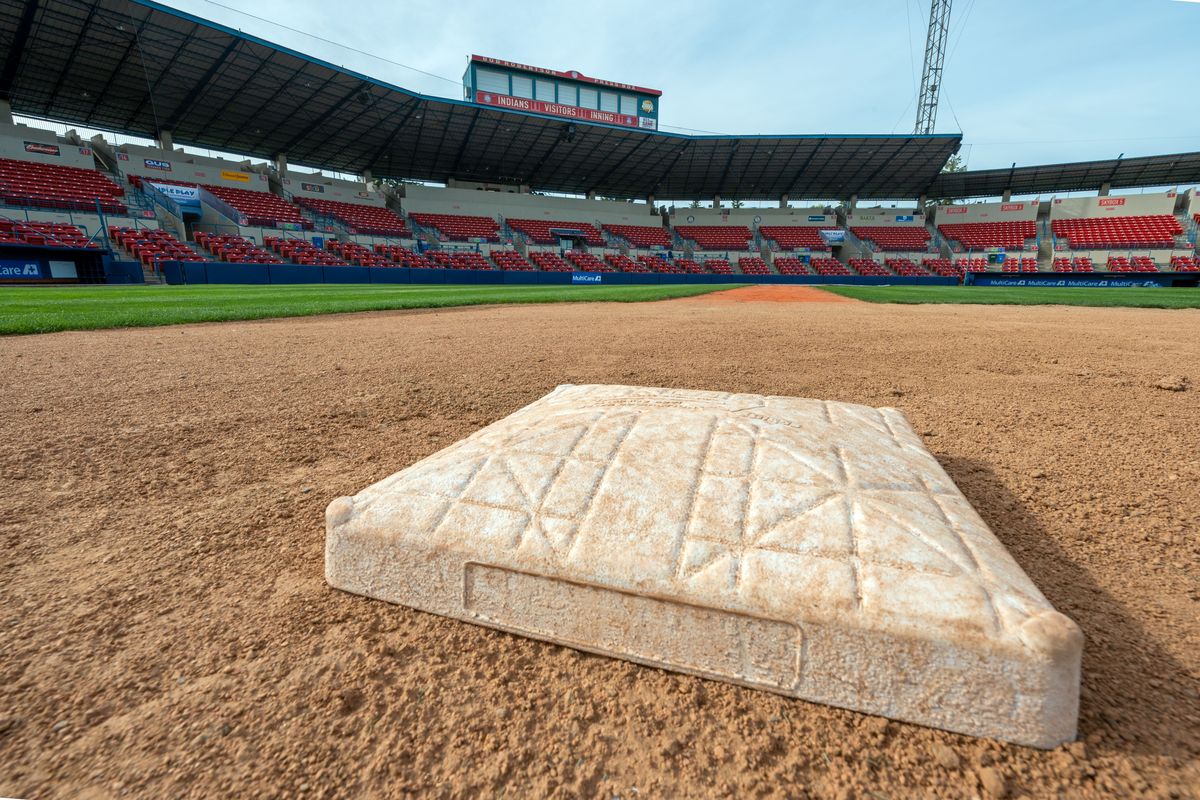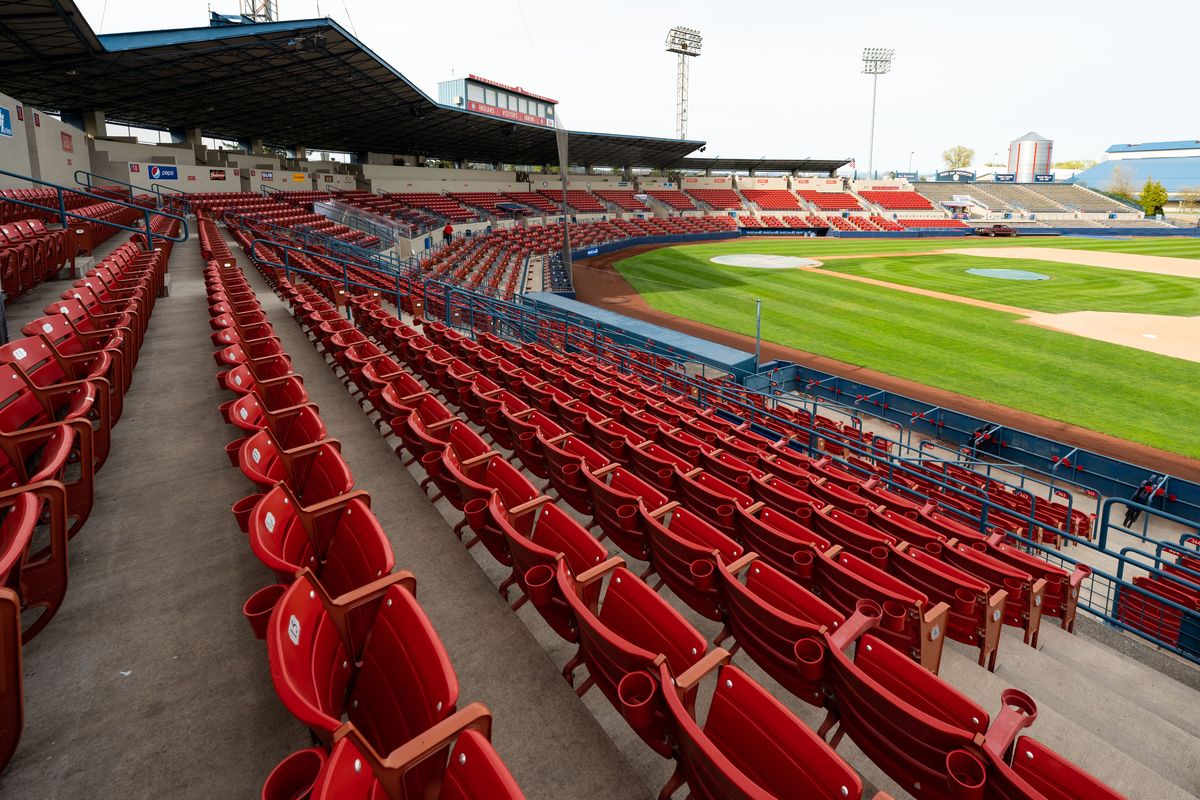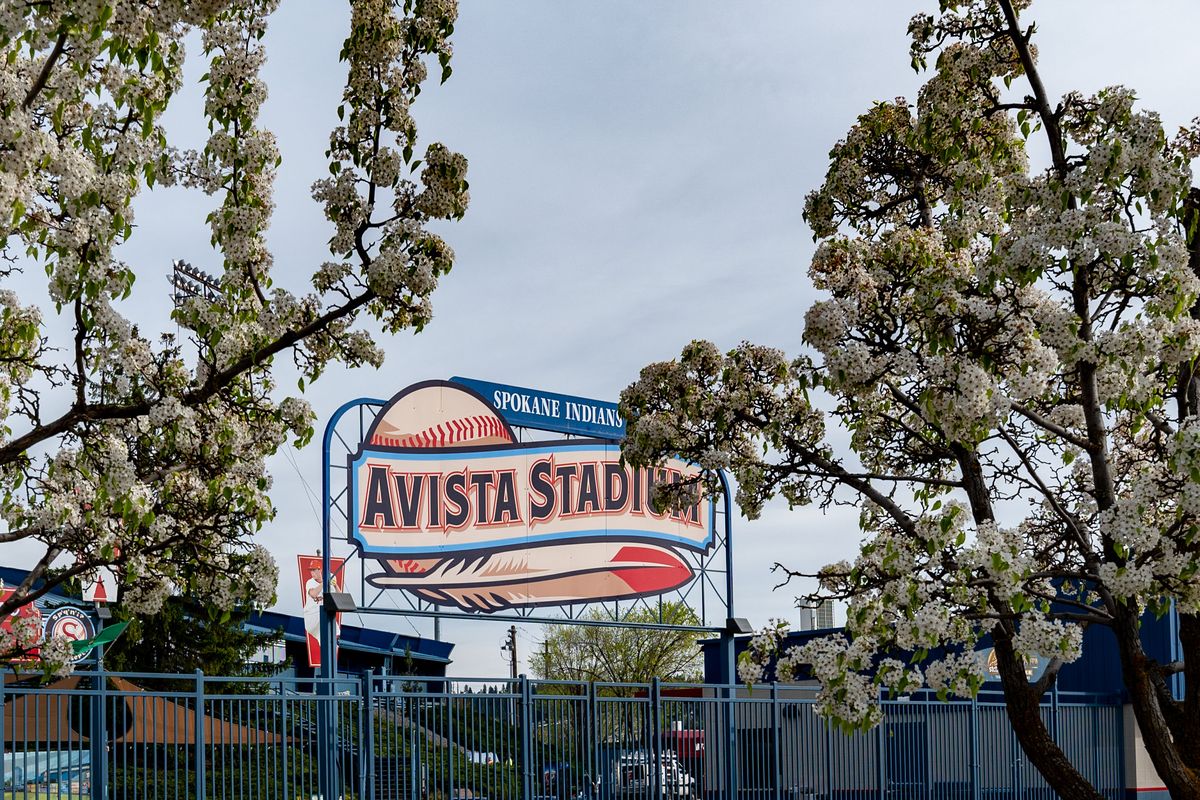Spokane Indians 2021: Organization welcomes players, fans, workers back to the ballpark
Avista Stadium is ready for the Spokane Indians to open their season at home on Tuesday, May 4th against the Eugene Emeralds for the start of a 120-game season, with 60 games at Avista Stadium. (COLIN MULVANY/THE SPOKESMAN-REVIEW)Buy a print of this photo
Baseball is back.
The big leagues have been at it for a month already, and high school teams in the area are well into their seasons as well. Now, minor league baseball returns across America after a tumultuous year away due to the pandemic and wholesale changes to the infrastructure of the game.
That includes the hometown Spokane Indians. The team arrived from minor league spring training in Phoenix on Saturday, and the organization has been preparing all winter to welcome fans back to Avista Stadium after the unplanned year off.
“This has been a year like no other,” Spokane Indians senior vice president Otto Klein said. “We’re excited to be at the ballpark, we’re excited to be here. Our staff is here. All preparations are ‘all systems go,’ so we’re blessed and feel lucky to be able to put on a season for the community.”
Welcome to Spokane
Most of the players and coaches arrived on Saturday and they’re all looking forward to getting to work.
Veteran minor league manager, coach and scout Scott Little was named manager of the club in February.
“I haven’t seen a real baseball game in two years now,” Little said on Saturday via Zoom conference call. “I’m ready to start. I’m ready to watch these guys play.”
One of the new players is Michael Toglia, the Rockies’ first-round pick out of UCLA in the 2019 draft who grew up in Gig Harbor, Washington.
“I’m pretty excited about it,” Toglia said. “My family is about three hours away, so I think they’re gonna be coming out to a lot of the home games. And my brother goes to Washington State, so he’s like 10 minutes away, so I’m going to be seeing a lot of family out here.”
Toglia debuted with Boise in 2019 when it was the short-season Northwest League affiliate of the Rockies.
“It was my first pro game, here against the Indians,” he said. “I remember the fans in the stadium and having kind of that (caboose) out in right field and kind of thinking that this is different from anything I’m used to.
“I was excited about it, and to find out that I’m coming back here after a year and a half off of baseball was pretty ironic. I’m just excited to get this thing rolling.”
Pitcher Chris McMahon was the Rockies’ second-round pick out of University of Miami in 2020 and due to the shutdown didn’t pitch last year.
He said 2020 was all about adjustments.
“Obviously, the college season getting banged, then the draft happening and still kind of not having a season over the summer,” he said. “Had to wait until October for instructional league. So it is a little frustrating, but I think the wait was worth it. And we’re right around the corner here.
“I’m very excited to get going and get the professional career started this week.”
Catcher Willie MacIver, originally from California, played for the Washington Huskies and played with Boise in 2018.
“I love the PNW,” he said. “I’ve grown accustomed to it over the years and it’s always a breath of fresh air to step out of the airport, so I’m ready to get back up here. I’m ready to start playing, I know we have a really good group – so excited.”
Weathering the storm
There’s no question the cancellation of the 2020 minor league baseball season hurt. A lot.
Fans missed gathering with their summer families, stadium workers lost paychecks and the camaraderie from being around the ballpark, and teams across the country were forced to lay off seasonal and full-time employees in order to survive.
“So much of minor league sports is dependent on ticket revenue and sponsorship revenue and concessions and all those things,” Klein said. “When they’re taken away, that’s tough.”
Klein mentioned some of the things the organization did in place of baseball last summer, including ballpark meals to go and an infield café to have lunch on the field.
“There’s nothing like being at the ballpark, having a hot dog and the whole thing,” he said. “Yes, last year it was without fans, but now we get to do it with fans. We’ve forgotten about last year, and we’re ready to move on.”
Longtime stadium worker Don Young is anxious to get back to his concession line.
“I first came to this ballpark in the late ’50s,” he said. “My dad brought us all in here on an opening night. So I’ve been part of this stadium forever.”
He was a season ticket holder while his kids were growing up and started working for the team after retirement. He rattled off the names of several stadium workers who have worked for many summers at the park.
“The sound, the smells,” he said. “It may sound cliché, but when you walk into the ballpark, and you can smell the fresh-cut grass and we have the popcorn going and the hot dogs are going. It’s Americana.”
Ch-ch-changes
The uniforms still look the same, but behind the scenes the Indians’ organization has undergone something of a transformation from last we saw them in 2019.
The changes MLB implemented across the minors affected the Indians as much as any organization – starting with a move from short-season to High-A.
“Basically, we were promoted two levels up,” Klein said.
With the move to High-A, most of the players assigned to the Indians by the Rockies will have a year or two of professional experience, instead of recently drafted players and international free agents assigned for short-season play and their first taste of the pro game.
“We’re going to have older, bigger, better, faster, stronger players here,” Klein said. “They’re going to be more disciplined as prospects.”
Along with that came a change of affiliation, from the Texas Rangers to the Colorado Rockies, with whom the Indians signed a 10-year development contract.
“It’s going to be a good partnership,” Klein said. “We’ve had a lot of contact with them so far. We’re going to be able to have some exciting new players and a new organization to talk about.”
The Indians will play a 120-game schedule this season, up from 76, and next year that will stretch to 132 games.
In addition, the schedule is broken down into weekly six-game series, either home or away, and every Monday will be an off-day for travel.
“It’s a nice thing being the same place for six days and not having to get up and move all the time,” Little said. “It is a long season, so I think less travel really benefits everyone.”
“That’s a big shift,” Klein said. “The outcome for Spokane is we get more baseball. It’s a difference I think that will be welcomed in the end.”
There’s also no midseason all-star game or postseason playoffs this year, though officials believe both will return next season.
Ballpark safety
Due to MLB, state and municipal protocols, there might not be quite as much pomp and circumstance for Opening Day on Tuesday as fans are accustomed. The Indians are making every effort to keep things as close to normal as they can while following the guidelines.
One of those restrictions is in stadium capacity. The club will be limited to selling 1,750 tickets per game, in seating pods, to start the season.
“Fan support is crucial,” Klein said. “We’re going to start with limited capacity. But it’s still going to be loud. There’s still going to be that magic that happens here at Avista Stadium.”
The team has set up a “Know Before You Go” tab on its website (milb.com/spokane) with information about COVID-19 precautions as you enter and travels through the park.
There you will find details about mask protocol (required, except while actively eating or drinking), digital tickets, restrictions on bags and outside food/beverages, social distancing, concessions and mobile ordering options.
Promotions and theme nights
Theme nights and in-stadium entertainment are part of the charm of minor league baseball. Unfortunately, due to the COVID-19 protocols installed by MLB in the minors, many of these attractions will have to be postponed or curtailed.
“The protection of the players and the safety of the players is going to be of the utmost importance,” Klein said.
Tuesday’s opener will feature fireworks, but folks will have to wail until June to see when the Indians can schedule “Star Wars Night” or any of the other popular theme nights. In addition, on-field activities between innings will be curtailed due to a “buffer zone” MLB has instituted between players and fans due to player safety precautions.
The team has set up platforms in the grandstands to host many of the usual entertainment features fans have been accustomed to on the field.
“We’ll be doing a lot of our fun promotions that we do, and games and trivia,” Klein said. “We’ll just do it from a different platform.”
Community outreach
The Indians’ organization will continue with its many outreach programs, including working with the Spokane Tribe’s initiative to revitalize its native language, the team’s “Redband Rally” campaign and its plan to be a “Zero Waste” leader in Minor League Baseball at Avista Stadium.
“The community campaigns are important for us,” Klein said. “Our partnership with the Spokane Tribe has been nothing but historic.”
Later in May, the team will have an announcement of a partnership with Fairchild Air Force Base.
“I think that anything we can do celebrate our airmen and all the great things they do at the base, but also our veterans,” Klein said.
“We have a lot of things we’re excited for,” he added. “We’re going to get baseball off the ground first.
“We’re going to get the team rolling, then end of May we’re going to a new (initiative) we think the community will respond to and we’re excited to debut.”



